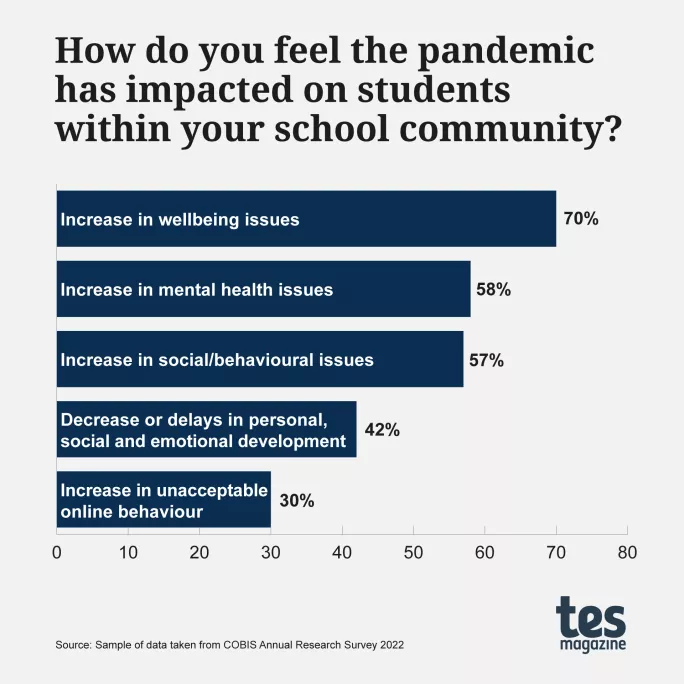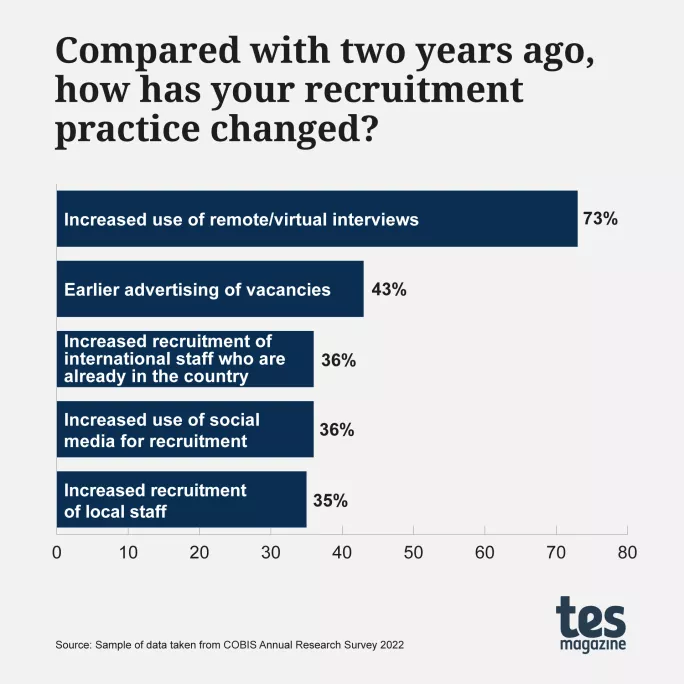- Home
- Analysis
- Specialist Sector
- International schools grow despite Covid impact
International schools grow despite Covid impact

British international schools maintained strong pupil growth over the past year, with new data from the Council of British International Schools (COBIS) showing that almost two-thirds saw student numbers increase for the current academic year.
In the latest COBIS Annual Research Survey, which drew on responses from 130 of its member schools across five continents, 62 per cent of respondents said numbers had increased - an improvement on the 51 per cent figure the year before.
Perhaps just as notably, only 18 per cent of schools saw a decrease in student numbers, compared with 30 per cent in the survey the year before.
Despite the increase of pupil numbers, the average class size for both primary and secondary schools was reported as 20, with a range between six and 30.
This suggests that while the pandemic and wider economic conditions have hit some schools in the sector, the majority remain unaffected and remain on a growth trajectory.
More international school content
- How Brexit hit international teacher recruitment
- How schools are adapting to changing parent communities
- The rise of international school alumni networks
Colin Bell, chief executive of COBIS, told Tes that it was clear numerous trends were driving this growth.
“We have seen the ongoing ‘flight to quality’ that the pandemic started continue as parents seek out the best educational experience for their children as possible,” he said.
“This is not just around high-quality teaching and learning but also wider extracurricular activities and community outreach and engagement opportunities that international schools offer.”
International schools growing but feeling impact of Covid
However, it seems clear that international schools are still feeling the impact of the pandemic, with 70 per cent reporting an increase in wellbeing issues and 58 per cent reporting a rise in mental health issues among pupils.
Furthermore, 57 per cent said they had seen an “increase in social/behavioural issues”, 42 per cent had seen a “decrease or delays in personal, social and emotional development” and 30 per cent had seen a rise in “unacceptable online behaviours”.

In response to some of these issues, 65 per cent of schools said they had increased pastoral or wellbeing support.
Furthermore, 88 per cent of schools responding said they had a member of staff other than the headteacher who has a specific focus on wellbeing - and of those schools, 20 per cent said the role was a dedicated full-time role on wellbeing.
“International schools have always had processes for focusing on wellbeing but it’s clear the pandemic accelerated a lot of this, including designating responsibility to more staff for wellbeing beyond the headteacher or principal,” Mr Bell said.
He noted, too, that conversations between international schools on these topics continued to be held to provide advice and help on tackling them.
”Schools are still really happy to share what the situations are, what their challenges are, they’re not afraid to like reach out to other professionals often in other parts of the world, such as safeguarding leads, to get help and ideas, and that’s a real strength of the sector,” Mr Bell added.
Meanwhile, with regard to younger children, 49 per cent of respondents said they had seen early years pupils join their school with “less well-developed communication and language skills”, 47 per cent had seen a “decrease in handwriting skills” and 30 per cent had seen a “decrease in attainment levels for primary pupils”.
On the more administrative side of life in international schools, 70 per cent of schools said they had maintained virtual/remote parents’ evenings (although this figure was down on 80 per cent last year) and 48 per cent were still hosting remote boarding meetings.
Recruitment trends are also covered in the report, with some clear changes caused by the pandemic: chiefly remote/virtual interviews and looking for staff already in their country, both those working overseas and local hires.

One other interesting statistic within the data is that although only 1 per cent of schools said they were offering fully online schooling - either for existing students or as a way to reach new ones unable to travel - 5 per cent were developing plans to do this and 25 per cent were considering developing this.
Mr Bell said this was something his organisation had noted, too, and that it demonstrated the ongoing innovation and growth that the sector had maintained in spite - and in part because of - the impact of the pandemic.
“It’s clear international schools are looking to the future, too, and what may come next,” he added.
You need a Tes subscription to read this article
Subscribe now to read this article and get other subscriber-only content:
- Unlimited access to all Tes magazine content
- Exclusive subscriber-only stories
- Award-winning email newsletters
Already a subscriber? Log in
You need a subscription to read this article
Subscribe now to read this article and get other subscriber-only content, including:
- Unlimited access to all Tes magazine content
- Exclusive subscriber-only stories
- Award-winning email newsletters
topics in this article



